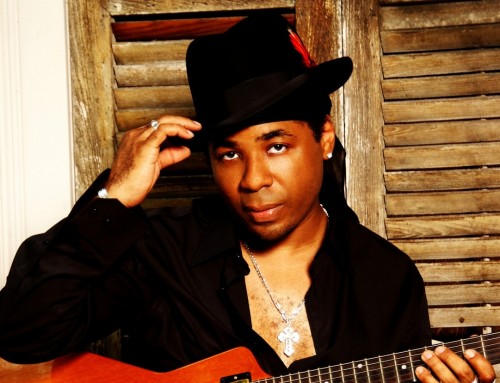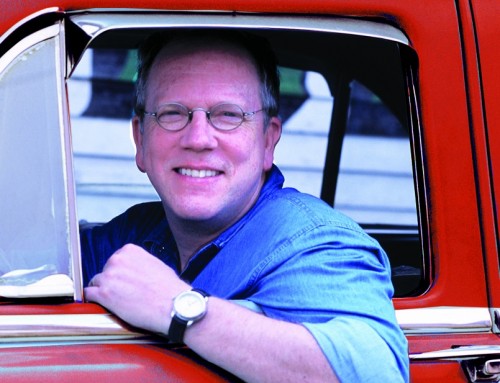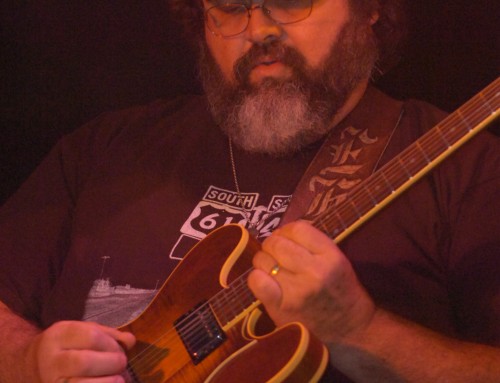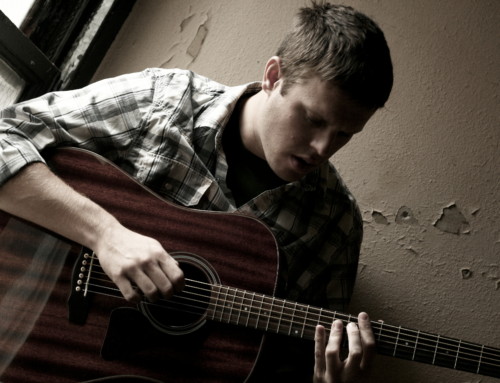Are there musical styles that are timeless, whose appeal cuts across generations? The success of Pokey LaFarge seems to argue “yes.” LaFarge, influenced by the ragtime of early 20th century, breathes new life into a traditional form, creating music that is contemporary but with deep roots. His signature instrument is the banjo, but you may also see him play the kazoo. His backup band, the South City Three (who perform without LaFarge as the Rum Drum Ramblers and have an aggressive blues sound), contains virtuosos on harmonica, upright bass, guitar, and washboard. This is the kind of music that makes you want to put on your glad rags, get a wiggle on, and toss aside the wet blanket and the gold digger, and hoof it while hitting on all sixes.
The night I saw him perform, the 26-year old musician was dressed in a blazer that covered a v-neck sweater and tie, his slicked-back hair hidden beneath a fedora. During the show, he openly pled for more respect for music of the 1920s and 1930s, but he is preaching to the choir, as the young folks who attend his shows have already gotten the message. They respond enthusiastically, clapping and dancing in rhythm. Some people are born to fill in columns in a ledger, some born to be on stage. LaFarge was born to be on stage.
I interviewed LaFarge first by email, then followed-up at the Bleeding Deacon pub in St. Louis in January 2010.
Tell me about where you grew up and your relationship with the Mississippi River during those years.
I grew up in southern Illinois and central Illinois, as well. My relationship with the river didn’t have a profound effect on me until my teen years, however. I did spend a lot of time going to St. Louis as a kid so it was always there for me. I’m sure that at least in some way it was affecting me since did see it quite often growing up.
What music did you listen to growing up?
I wanted to be a writer; get that out there. I started writing once I heard the blues. When I was like 13 or 14, the blues that I heard, I used to hang out at this pizza joint called Jake’s….He played mostly like Robert Johnson, Howlin, Wolf, Muddy Waters, and what not. It wasn’t until later when I started to dig back into the ‘20s and ‘30s stuff—obviously Robert Johnson was ‘30s stuff—the names that everyone knows…I heard the blues as this type of poetry that was being sung. It wasn’t until I turned 17, when I heard bluegrass, that I started playing the mandolin, and it was from bluegrass that I moved into playing the fiddle.
What music do you listen to now?
Blues (Country, Delta, Hill Country, Ragtime, Jump, etc.), Ragtime, Jazz (Dixieland, early pop, swing) Western Swing, Country (Roots), Old-Time, Bluegrass, west African music, eastern European music, jug band music.
Describe your musical style.
Country Blues and Ragtime string band music with a strong influence of western swing, 20’s jazz, and all those sweet 20’s/30’s type influences.
One thing I was curious about was, when you are working with a musical style that has really deep roots like that, how do you create new songs without just mimicking things from the past? Do you feel like you’re doing something to give it a slightly more modern edge?
A lot of this is stuff about the same things in just a matter of how you say it because there’s going to be things that you can’t really control. You can convey a modern touch in the way you say things, you know, a lot more urban, there’s an urban way of saying things, compared to a more country kind of way of saying things.
More in the language you are using for the lyrics?
Um,..for instance, you could hear a song of mine…and then you hear this little touch where you like that kind of sounds like this guy listened to punk rock. That’s not me, but I would say that about Rum Drum
It seems like with them, too, at least part of the punk influence may be the energy they bring to the show.
Of course; that’s a lot of it. But out of a lot of the musicians I know that got to that point, they are some of the few that are playing old music and used to be punk rockers and still have that punk rock aspect and it’s strong in the progression and how their music actually sounds.
But, too, you’re still singing about life experiences, I mean love is a very basic thing, one thing that happens to a lot of us, so you obviously want to sing a lot of songs, so that’s one thing. Heartbreak is another. And the blues are some things like jealousy, things that happen to everyone, and when that feeling comes in, it hits you right away, it just kinda fucks you up instantly, and if you dwell on it, it will fuck you up even more. That’s the blues. And, so, anyone can sing about that.
Now, there’s also things that one sees in a lifetime such as rivers which you are talking about…I mean, rivers for me are a spiritual thing…I’m a cancer, I’m a water sign; maybe that has something to do with it… at the same time musically and historically, the Mississippi, the Ohio, Tennessee Rivers, these are all rivers that set out the framework of this country, especially musically.
How would you define “music of the Mississippi River?” Is it defined by geography? Content? Style?
Yes, you could say style. …It’s hard to say if the style stands out anymore. And I wouldn’t say the Mississippi river music has its own style but I would say that it has Memphis, St. Louis, and New Orleans, which all of have their own specific styles of music.
When you think about river music, what musicians come to mind?
St. Louis guys like Chuck Berry, Charley Jordan, Peetie Wheatstraw, Roosevelt Sykes. Memphis guys like Frank Stokes, Furry Lewis, Robert Wilkins, Otis Redding, Al Green. New Orleans guys like Louis Armstrong, Sidney Bechet, Lonnie Johnson, Fats Domino, Prof. Longhair.
Who are some contemporary musicians who exemplify river music?
The Rum Drum Ramblers(St. Louis), Loose Marbles(New Orleans), Charlie Halloran (St. Louis and New Orleans), Crow Quill Night Owls (Washington), Kit Stovepipe(Washington), Woody Pines (North Carolina), Red Stick Ramblers (Louisiana).
River Songs: La La Blues; Cairo, Illinois
Other Song You Shouldn’t Miss: Migraines and Heartpains
Visit his website here.
© Dean Klinkenberg, 2011





